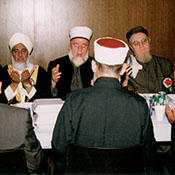 Across the globe, including in the United States, Mawlid al-Nabi, the birthday of the Prophet Muhammad, is celebrated on the twelfth day of the month Rabi’ al-Awwal. Celebrations include festivals, prayer services, recitations of poetry and litanies, as well as religious gatherings. Celebrations of the Mawlid in America and distinctly English forms of poetry, songs, and literature shows the increasing importance of Mawlid al-Nabi amongst American Muslims.
Across the globe, including in the United States, Mawlid al-Nabi, the birthday of the Prophet Muhammad, is celebrated on the twelfth day of the month Rabi’ al-Awwal. Celebrations include festivals, prayer services, recitations of poetry and litanies, as well as religious gatherings. Celebrations of the Mawlid in America and distinctly English forms of poetry, songs, and literature shows the increasing importance of Mawlid al-Nabi amongst American Muslims.
View Full Album
On the twelfth day of the third month, Rabi’ al-Awwal, many Muslims commemorate the birthday of the Prophet Muhammad. In many predominantly Muslim countries, Mawlid al-Nabi is a major public holiday. Some Muslims refuse to participate in this observance, feeling it is an innovation which places too much emphasis on the Prophet as human and distracts from the true divine source of revelation. Other Muslims view this festival as a means to teach their communities about the Prophet Muhammad’s way of life, which all Muslims seek to emulate.
Throughout the world, there are a variety of expressions for the observance of the birth of the Prophet: some celebrations take place simply in private homes; other Muslims decorate their local mosque with lights and hold large festive gatherings. Celebrations of Mawlid al-Nabi include sharing food, attending lectures about the Prophet’s life and virtues, salawat prayer services, participating in marches, and reciting the Qur’an, litanies, and devotional poetry of the Prophet. In some countries, such as Pakistan, the entire month of Rabi’ al-Awwal is observed as the Prophet’s “birth month.” In Singapore, the observance of Mawlid al-Nabi is a one-day festival which often includes special “birthday parties” for poor children and orphans in addition to the regular prayers and lectures in local mosques. Azhar Square in Cairo is the site of one of the largest celebrations, with over two million Muslims in attendance.
In 1994, the First International Mawlid al-Nabi Conference was held in Chicago, Illinois, organized by the Peoria-based Naqshbandiya Foundation for Islamic Education (NFIE). At the conference, shaykhs and scholars from around the world argued for both the religious precedence and cultural importance of the celebration of the birth of the Prophet. More than 1,200 people from across North America and from overseas attended this spiritual conference, the theme of which was “Love of God and His Prophet.” A second conference, “Spiritual Aspects of Islam,” was held in 1995. Lectures were presented by eminent scholars and Sufi leaders from around the world; devotional poetry in praise of the Prophet Muhammad was delivered in Arabic, Farsi, Urdu, Kurdish, Bosnian, and English. Planning for the third annual conference in Chicago included efforts to coordinate with other Muslim organizations to hold similar gatherings in major North American cities during the month of Rabi’ al-Awwal. In 2011, the conference was held in Edison, N.J., with corresponding festivals held in London and Pakistan. In 2019, the conference celebrated its 36th year with attendees gathering in Lahore, Pakistan.
The various ethnic groups in the American Muslim community bring their distinct customs to the festival observance of Mawlid al-Nabi. This may include regional poetry, songs, litanies, and dishes. Mosques and Muslim student organizations at universities across the U.S. hold events commemorating the Mawlid; this may include lectures, recitation of praise poetry, and salawat prayer services in which God is invoked to send blessings on the Prophet, his family, and his followers. Some Islamic centers hold special programs for children, where they learn about the character and life of the Prophet, examine the way he dealt with important moral issues and with political and military affairs, how he handled challenges, and how he responded to his enemies and his friends. Children often prepare essays or skits that present important teachings or events in Muhammad’s life.
Many Muslims feel that the celebration of the Prophet’s birthday is particularly important in the American context, and have therefore begun to add distinctly American elements as part of its celebration. Shane Atkinson of the American Mawlid Project produces music to amplify praise of the Prophet in an original American style. His songs, “Southern Salawat” and “Appalachian Salawat” fuse elements of Southern and Appalachian music styles with traditional Islamic themes. While al-Burda al-Sharif, the most popular praise poem of the Prophet, has now been translated several times into English from Arabic, original praise poetry in English has also been produced from the likes of Walid Lounès Bouzerar, Asim Yusuf, Cat Stevens, and Baraka Blue. Other literature in English today includes works on the rulings, virtues, benefits, and methods of celebrating Mawlid al-Nabi. Organizations like Celebrate Mercy and Grand Mawlid are dedicated to spreading the message of Mawlid al-Nabi throughout the year by hosting conferences, classes, and events with prayer and poetry performances with renowned Muslim American scholars, artists, and activists. The various ways in which American Muslims adopt the celebration of Mawlid al-Nabi shows both their love for the Prophet and their concern with passing this onto the next generation.